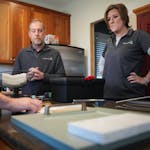For many experienced workers with retirement savings and a home to call their own, the biggest financial risk they face currently is losing their jobs. Retirement portfolios have gained in value and home prices have gone up during the pandemic recession.
The job market is another story, as we well know. By the end of the second quarter 2.9 million workers ages 55 to 70 had left the labor force, according to the Schwartz Center for Economic Policy Analysis at the New School. The layoffs have hit women and minorities particularly hard.
Employers may be reluctant to hire older applicants over concerns about their susceptibility to COVID-19. When older workers do find a job it often pays less than their previous employment.
There are no easy answers when it comes to the job market, especially during a pandemic. Still, near-retirees — and anyone else for that matter — can hedge against the risk of job loss by taking a number of steps now.
Maintain your network of colleagues, former workmates and acquaintances. Most job referrals come through personal connections, especially for older workers. Examine your household budget, figure out where you're most financially vulnerable, and take steps to reduce that particular risk now. Take the time to think about what it is you might like to do if your job is eliminated.
I would add to your "to-do" checklist investigating prospects for self-employment, freelance work, gig economy tasks — pick your favorite euphemism. Upwork, the online platform that matches employers with freelancers and independent professionals, recently released its survey, Freelance Forward: 2020. Not surprisingly, the independent workforce survey found a modest net increase in freelancing during the pandemic. One factor that has helped the freelance workforce is many were used to telework well before the pandemic struck.
Looking at the survey results for those 55-plus, 65% of boomers who freelance said independent work is a good way to transition into retirement. Among the 48% of freelancers who are caregivers, more than two-thirds say that freelancing provides them an alternative for supporting a family. When thinking about what might come next, I would see if self-employment is a practical option for you. You might want to learn more about various high-tech platforms that link you to customers. An advantage of understanding the platforms is it's one way to test the entrepreneurial waters without a big commitment in time and money.
Chris Farrell is senior economics contributor, "Marketplace," and Minnesota Public Radio.

![Rochester skyway, Tuesday, Feb. 1, 2022, Rochester, Minn. ] GLEN STUBBE • glen.stubbe@startribune.com](https://arc.stimg.co/startribunemedia/4AJGG6ELZQCXOVB7MODR3MG6QY.jpg?w=75&h=75&fit=crop&crop=faces)

